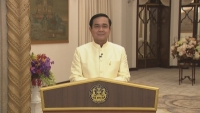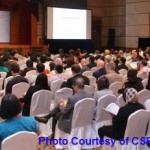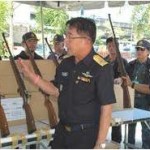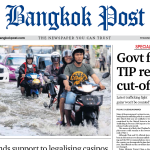
English subtitle of PM weekly televised address on 27 February 2015
Start at 16.47 minute
As for labor affairs, the problem of labor shortage is a very important issue at this time. I think we should address this problem. Thailand needs to find labor to feed domestic industry that includes factories, for example. Labor is also needed to accommodate the ASEAN Economic Community integration at the end of this year. It is expected that we will be short of 60,000 to 70,000 workers by early next year. Although large numbers of foreign workers, numbering in the millions, have become registered, there is still a shortage because Thais have switched to other occupations such as those in the service and tourism industries and jobs that are not labor-intensive.
We need to designate various types of labor and prepare for additional importation of labor from neighboring countries. To avoid problems, this must be done legally by means of proper registration. Labor skill development is also an important matter. I have tasked the Ministry of Education with seeking multilateral cooperation with various companies in Thailand for the training of such workers. In additional to providing skilled labor, these workers will also be capable of becoming work leaders. We are trying to have all entities that come over to invest in Thailand to relay technologies to us, and to have them appoint some of our people to leading positions in the production process. There are some hurdles at present, namely worker capability, problems with learning and education system, and language. These issues must be tackled within this year or else progress will not be made.
There are many hill-tribe people who are presently unemployed. Consideration is being given to developing their labor skills. This group of individuals already resides in Thailand and has a Thai identity conscience. Relevant permits will need to be issued, so that they will no longer encroach on forest areas to making their living. This will be on a voluntary basis. I would like them to become good workers and help the country. In turn, their futures will become secured and the problem of labor shortage will be addressed at the same time.
The government places great importance on issues of human rights, human trafficking and IUU fishing. There is a clear deadline for us to update on our progress and for concrete and progressive results to be shown. Multilateral discussions are being made to improve memorandums of understanding with Laos, Myanmar and Cambodia. Presently this needs to be extended to Vietnam. Planning for the next phase is also needed, as there will be extension of collaboration in 4 issues. The first issue involves CLMV countries’ collaboration on worker training. The second issue involves labor skill standards. The third issue deals with importation and exportation of workers. The fourth issue concerns other collaborative matters. After discussions, negotiations will take place with each country. This is expected to commence in March.
An important aspect of human trafficking garnering the attention of foreign countries is the assistance of victims. ‘Victims’ mean those who have been lured into labor, whether on land, or on fishing vessels at sea. We need to consider how we care for these victims, and whether we have rehabilitated them. Some understanding needs to be created with the media, both domestic and foreign. Most of the time, the press would question the victims, and sometimes misunderstanding ensues. The Ministry of Foreign Affairs has been tasked with placing special importance on this affair. We already have a working committee for this purpose, chaired by myself. There are several subcommittees. Recently, reports of progress were made to the Ministry of Foreign Affairs.
Progress has been made in addressing Thailand’s fisheries labor force. Some 50,000 fishing vessels have been registered, and 25,000 of these have already received fishing licenses. The current delay is due to the vessels not meeting standards. How do we enter the rest into the system? If we keep being lax on enforcement then these vessels will be subject to arrest under international law. You must understand that each country safeguards its resources. Even if we were to be lax, you will face arrest and your vessel may be destroyed. This cannot be good. Some 20 command centers for the monitoring of fisheries have been established to oversee concurrence to fishery laws. 176 cases have resulted from arrests of 878 offenders. At the same time, the government is proceeding with a vessel monitoring system for fishing vessels that have a gross tonnage of 60 and above. This is expected to be finished in March. I would like to ask the vessel operators for their cooperation in this undertaking.
As for the problem of fishing in Indonesian waters, the Department of Fisheries will have another discussion with Indonesian authorities about methods of joint investment in fishing. This would cover talks on whether Indonesia’s restrictions could be extended in order for Thailand to have time to improve its fishing vessels to meet Indonesia’s new regulations. Every country is subjected to these changes and has adapted. In our case, not much cooperation has been given to working together on this issue. I would like express appreciation for the current cooperation by the majority, which has helped move things along more quickly.
End at 23.04 minute




